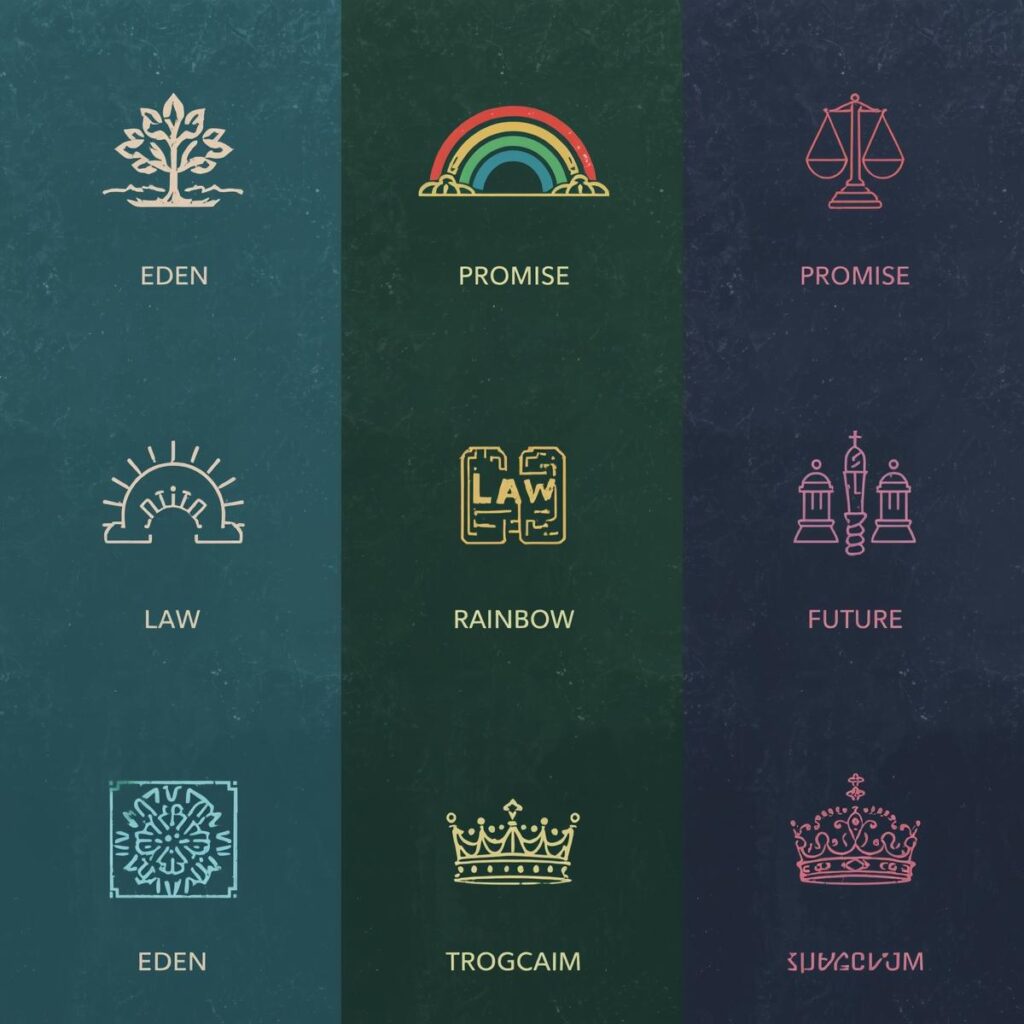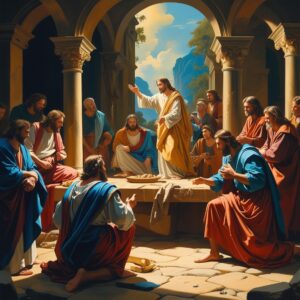What is Dispensationalism?
Think of the Bible as a big play with several acts. In each act, God works with humanity in a different way to achieve His purposes. Each of these “acts” is called a dispensation, a period of time where God tests people according to a specific revelation of His will.
The main idea is that God has had different “rules” or “administrations” for different periods in history. It helps explain why, for example, the rules for the nation of Israel in the Old Testament (like animal sacrifices) are different from the instructions for the Church today.
The Main “Acts” (Dispensations)
While different teachers count them differently, a common list includes seven dispensations:
- Innocence (Eden): God’s simple rule for Adam and Eve. It ended with the Fall.
- Conscience (After Eden to the Flood): Humanity was governed by their conscience. It ended with the worldwide flood.
- Human Government (After the Flood): God established human authorities (like Noah) to judge evil.
- Promise (Abraham to Moses): God made a special promise to Abraham and his family.
- Law (Moses to Jesus): God gave the Law (the Ten Commandments and other rules) to the nation of Israel.
- Grace (The Church Age): We are here right now. (See below).
- Millennium (The Future Kingdom): A future 1,000-year reign of Jesus Christ on earth.

What Dispensation Are We In Now?
We are currently in the Dispensation of Grace, also called the Church Age.
This period started on the Day of Pentecost (in the book of Acts) when the Holy Spirit came down and the Church was born. It will end with the Rapture—the moment when Jesus comes to take all believers to heaven.
Key features of our current dispensation:
- Salvation is by Grace through Faith: We are saved by trusting in Jesus’s death and resurrection, not by following the Old Testament law.
- The Church is Central: The Church (all believers in Jesus) is God’s primary focus on earth. It is a group made up of both Jews and non-Jews (Gentiles).
- The Holy Spirit Lives in Believers: Every Christian has the Holy Spirit inside them as a helper and a guarantee of salvation.
How It Affects the Church and World
1. For the Church:
- A Clear Mission: It gives the Church a clear purpose: to preach the gospel and make disciples during this age of grace.
- A Blessed Hope: The belief in the Rapture gives Christians hope that they will be rescued from the future time of God’s judgment (the Tribulation).
- A Distinction from Israel: It teaches that God still has a future plan for the nation of Israel. This means the Church has not “replaced” Israel. Many promises in the Old Testament will be literally fulfilled for Israel in the future.
2. For the World:
- It Explains Evil: This view explains why there is so much evil and suffering—we are in an age where God is showing grace and patience, not executing immediate judgment.
- A Warning of Future Judgment: It teaches that after this age of grace, a terrible seven-year period of judgment (the Tribulation) is coming upon the whole world.
Arguments FOR Dispensationalism
- It Takes the Bible Literally: It tries to take the Bible at its word unless the context clearly says it’s a symbol. For example, it believes God’s promises to Israel (like the land) are literal and will be literally fulfilled.
- It Explains the Big Picture: It provides a clear and organized timeline for understanding the entire Bible, from Genesis to Revelation.
- It highlights God’s Grace: By showing that people failed under every other system (like conscience and law), it makes God’s grace in Jesus Christ shine even brighter.
- It Motivates Mission: The belief that the Rapture could happen at any moment encourages Christians to share their faith urgently.
Arguments AGAINST Dispensationalism
- It Can Divide the Bible Too Much: Critics say it creates artificial divisions in the Bible and can make it seem like God has different ways of salvation in different periods. Most opponents argue that salvation has always been by grace through faith (even in the Old Testament).
- It “Replaces” Israel Wrongly: Some believe that the Church is the “new Israel” and that God’s promises to Israel are now spiritually fulfilled in the Church. They see no future separate plan for a national Israel.
- It’s a New Idea: This system of interpretation was only developed in the 1800s. Critics argue that the early Church fathers and most Christians throughout history did not see the Bible this way.
- Can Lead to “Escape” Mentality: The focus on the Rapture can sometimes make Christians only care about “getting to heaven” and neglect their responsibility to care for God’s creation and work for justice in the present world.
In the end, Dispensationalism is one major way to understand the Bible’s story. Many evangelical Christians hold to a form of it, but it is not the only Christian viewpoint. Understanding it helps explain a lot of popular Christian beliefs about the end times and God’s plan.

The Opposite of Dispensationalism is called Covenant Theology.
Think of it this way: If Dispensationalism sees the Bible as a play with many different acts, Covenant Theology sees the Bible as a single, unified story with one main theme.
What is Covenant Theology?
Covenant Theology organizes the entire Bible around the concept of covenants—or sacred agreements—between God and humanity. The key idea is that there is only one eternal people of God, and God has always related to them through a framework of covenants, all leading to and fulfilled in Jesus Christ.
Instead of dividing history into separate “administrations,” it sees a continuous story of redemption.

The Two (or Three) Main Covenants
Covenant Theology typically focuses on two or three overarching covenants:
- The Covenant of Redemption: An agreement made between the members of the Trinity before time began. The Father planned salvation, the Son (Jesus) agreed to accomplish it by dying on the cross, and the Spirit agrees to apply it to believers.
- The Covenant of Works: God’s agreement with Adam in the Garden of Eden. God promised life for perfect obedience. Adam broke this covenant, bringing sin and death into the world.
- The Covenant of Grace: This is the central covenant. After Adam sinned, God immediately established a covenant of grace. In it, God promises to save sinners through a coming Savior (Jesus). Everyone in the Old Testament who was saved (like Abraham or David) was saved by grace through faith in this promised Savior, just like people are today.
Key Differences at a Glance
| Feature | Dispensationalism | Covenant Theology |
|---|---|---|
| Main Idea | Different “acts” or administrations in God’s plan. | One continuous story of redemption through covenants. |
| God’s People | Two distinct peoples: Israel (earthly promises) and the Church (spiritual promises). | One unified people of God: The Church is the “true Israel” and inherits all God’s promises. |
| The Old Testament | Many promises to Israel (like land) are for literal, ethnic Israel in the future. | Promises to Israel are ultimately fulfilled in Jesus and the Church, often spiritually. |
| The Law | The Law of Moses was for a specific dispensation and is not for the Church today. | The Law is divided into moral, civil, and ceremonial. The moral law (e.g., Ten Commandments) still guides Christians. |
| End Times View | A literal 1,000-year earthly reign of Christ (Millennium) after His Second Coming. | Usually Amillennial—the Millennium is a symbolic reign of Christ from heaven during the current church age. |
The Simple Differences between the Two
- Dispensationalism is like a parent who raises each child with different, age-appropriate rules. A 5-year-old has different chores and privileges than a 16-year-old. The parents’ love is the same, but the method changes.
- Covenant Theology is like a king who establishes a constitution for his entire kingdom. The fundamental laws and promises are the same for everyone, from the founding of the kingdom to the present day. New decrees may clarify the constitution, but they don’t replace the original covenant.
If you hear a pastor talk about the Church being “spiritual Israel” or emphasize the unity of the Bible from Genesis to Revelation under the “Covenant of Grace,” they are likely coming from a Covenant Theology perspective. It’s the traditional framework of Reformed, Presbyterian, and many Baptist churches.







